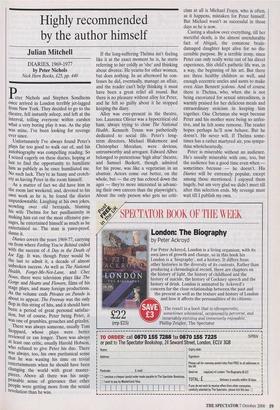Highly recommended by the author himself
Julian Mitchell
DIARIES, 1969-1977 by Peter Nichols Niek Hem Books, £25, pp. 440 Peter Nichols and Stephen Sondheim once arrived in London terribly jet-lagged from New York. They decided to go to the theatre, fell instantly asleep, and left at the interval, telling everyone within earshot what a very boring play it was. As the play was mine, I've been looking for revenge ever since.
Unfortunately I've always found Peter's plays far too good to walk out of, and his autobiography was compelling reading. So I seized eagerly on these diaries, hoping at last to find the opportunity to humiliate him as publicly as he once humiliated me. No such luck. They're as funny and crotch- ety as having Peter in the room himself.
As a matter of fact we did have him in the room last weekend, and, devoted to his own work as he is, he found the diaries imputdownable. Laughing at his own jokes, scowling over old betrayals, blaming his wife Thelma for her pusillanimity in making him cut out the most offensive pas- sages, he entertained himself as much as he entertained us. The man is yawn-proof, damn it.
Diaries covers the years 1969-77, carrying on from where Feeling You're Behind ended with the success of A Day in the Death of Joe Egg. It was, though Peter would be the last to admit it, a decade of almost unbroken success. As well as The National Health, Forget-Me-Not-Lane, and Chez Nous, there were television plays like The Gorge and Hearts and Flowers, films of his stage plays, and many foreign productions. As the volume ends Privates on Parade is about to appear. The Freeway was the only flop in this string of hits, and it should have been a period of great personal satisfac- tion, but of course, Peter being Peter, it was one of grumbles, grouches and grizzles. There was always someone, usually Tom Stoppard, whose plays were better reviewed or ran longer. There was always at least one critic, usually Harold Hobson, who refused to give Peter his due. There was always, too, his own puritanical sense that he was wasting his time on trivial entertainments when he should have been changing the world with great master- pieces. Above all there was his unap- peasable sense of grievance that other People were getting more from the sexual revolution than he was. If the long-suffering Thelma isn't feeling like it at the exact moment he is, he starts referring to her coldly as 'she' and thinking about divorce. He yearns for other women, but does nothing. In an afterword he con- fesses he did, eventually, manage an affair, and the reader can't help thinking it must have been a great relief all round. But there is no pleasure without alloy for Peter, and he felt so guilty about it he stopped keeping the diary.
Alloy was ever-present in the theatre, too. Laurence Olivier was a hypocritical old ham, always trying to close The National Health. Kenneth Tynan was pathetically dedicated to social life. Peter's long- term directors, Michael Blakemore and Christopher Morahan, were devious, untrustworthy and arrogant. Edward Albee belonged to pretentious 'high altar' theatre, and Samuel Beckett, though admired for his prose, was like a vegetarian in an abattoir. Actors come out better, on the whole, but — the cry has echoed down the ages — they're more interested in advanc- ing their own careers than the playwright's. About the only person who gets no criti- cism at all is Michael Frayn, who is often, as it happens, mistaken for Peter himself. But Michael wasn't as successful in those days as he is now.
Casting a shadow over everything, till her merciful death, is the almost unendurable fact of Abigail, the comatose brain- damaged daughter kept alive for no dis- cernible purpose. By a terrible irony, since Peter can only really write out of his direct experience, this child's pathetic life was, in a way, the beginning of his art. But there are three healthy children as well, and enough eccentric uncles and aunts to make even Alan Bennett jealous. And of course there is Thelma, who, when she is not being excoriated for sexual unreadiness, is warmly praised for her delicious meals and extraordinary stoicism in keeping him together. One Chrismas she wept because Peter and his mother were being so unfes- tive, and he felt some remorse. The reader hopes perhaps he'll now behave. But he doesn't. He never will. If Thelma some- times has a rather martyred air, you sympa- thise wholeheartedly.
Peter is miserable without an audience. He's usually miserable with one, too, but the audience has a good time even when — sometimes because — he doesn't. His Diaries will be extremely popular, except among those mentioned. I enjoyed them hugely, but am very glad we didn't meet till after this selection ends. My revenge must wait till I publish my own.


















































































 Previous page
Previous page